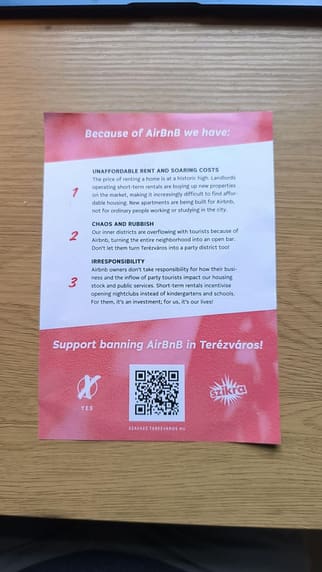It is a trend that I am observing and that is set to continue – governments increasingly regulating, restricting, or even outright banning Airbnbs.
The latest victim is the 6th district of Budapest, one of the city’s more central neighborhoods.
After a campaign by activists (most likely sponsored by the hotel lobby), a referendum was announced, and earlier this week people voted for a complete Airbnb ban from 2026 onward.


Airbnb is still allowed in other districts of Budapest but the noose is tightening. I discussed this in detail with Benedek, my real estate buyer’s agent in Budapest.
This is why when I buy Airbnb apartments, I always make sure to choose apartments that would also do well on the long-term market, even if it means sacrificing yield. You must always have a decent back-up option when investing in an Airbnb market, especially if it’s in a city with a lot of local residents and not a pure holiday destination.
However this means opportunity for investors wishing to enter the Budapest property market
Though the long-term rental market is strong in Budapest, and getting stronger as Hungary’s home-ownership rate decreases, some sellers are going to panic sell over the next year.
Patient investors, who see the great value that Budapest offers versus other European capitals, will most likely come across some interesting opportunities to add gorgeous historical real estate to their international real estate portfolio.
I wrote an analysis of the Budapest real estate market. It’s a market I know well, having myself invested in this beautiful Central European city.
You can also get in touch with Benedek.
To a World of Opportunities,
The Wandering Investor.
Available services in Hungary:
- A Real Estate Lawyer in Budapest, Hungary
- My favourite buyer’s agent in Budapest, Hungary
- Golden Visa in Hungary through real estate investment
Other articles on Hungary:
- A cheap Plan B in rural Hungary
- Investing in the Stock Market in HUNGARY, good value or value trap?
- BREAKING NEWS: Hungary Golden Visa – what we know so far
- How to maximize Airbnb yields when you invest in Budapest – up to 10% net yields
- Full Guide to Investing in Real Estate in Budapest, Hungary
- Best neighbourhoods and districts to buy Real Estate in Budapest
If you want to read more such articles on other real estate markets in the world, go to the bottom of my International Real Estate Services page.
Subscribe to the PRIVATE LIST below to not miss out on future investment posts, and follow me on Instagram, X, LinkedIn, Telegram, Youtube, Facebook, Rumble, and Odysee.
My favourite brokerage to invest in international stocks is IB. To find out more about this low-fee option with access to plenty of markets, click here.
If you want to discuss your internationalization and diversification plans, book a consulting session or send me an email.
Transcript of “Airbnb regulations and potential ban in Budapest, Hungary”
LADISLAS MAURICE: Hello, everyone. Ladislas Maurice from thewanderinginvestor.com. Today, we shall be discussing new Airbnb restrictions and bans in some areas of Budapest, together with Benedek that has been helping foreigners invest in the Budapest real estate market for a number of years. Benedek, how are you?
BENEDEK: I’m fine. Hi, Ladislas. Hi, everyone. Nice to talk to you again.
Referendum to ban Airbnb in the 6th district of Budapest
LADISLAS MAURICE: Apparently, there has been a referendum in the Sixth District against Airbnb. Can you elaborate, Benedek?
BENEDEK: Yes. The referendum was announced in the beginning of August, and it took place in the first two weeks of September, where the municipality and the mayor of the Sixth District held a referendum about completely banning Airbnb rentals in the district. This is only for the Sixth District, not for the whole Budapest. And the referendum closed and we got the results yesterday. Surprisingly, not a huge majority of people voted for banning the Airbnb, only 54%. But still, this is a majority, so the Sixth District will proceed with banning the Airbnb rentals altogether. Technically speaking, this will mean that, legally, they are not exactly allowed to ban Airbnb rental as such, but they have the tool to limit the rentable days.
Impact of Airbnb ban in 6th district of Budapest
As a technicality, they will be limiting the rentable days to zero starting from 2026 1st of January. There is still almost one-and-a-half years left from the short-term rental opportunity in the Sixth District but I doubt that anyone should be readying new licenses for this a bit more than one year that’s left. This, obviously, means that, right now, there is approximately 2,300 Airbnb rentals in the district, so these units will either get on the market for sale or be turned into a long-term rental in this timeframe, which we are expecting that this will mean a decrease in the prices of these properties. I suspect that many investors will already want to exit their investment in this area.
LADISLAS MAURICE: Do you think that many people are going to want to exit? Because the reality is, most investors buying in Budapest in the Sixth District are foreign and, typically, they come with cash rather than mortgages. Because, I mean, as a foreigner, you can’t get a mortgage locally, and only a small percentage of foreigners get mortgages in their own country for a purchase in Budapest. And even locals who bought in the Sixth District, often because it was a bit more expensive, because it was just an investment, typically, from what I observed, is more cash buyers. So do you think people will really sell, a lot of people will sell the apartments?
BENEDEK: Big value transactions are, typically, made by foreigners but there are also a lot of local purchases from the smaller retail investors in Hungary. Of course, we cannot be sure about this, but there is an opportunity that some owners will want to sell their property and exit their investment.
Airbnb regulations in Hungary
LADISLAS MAURICE: Yeah. Do you see this trend spreading to other districts or other parts of Hungary?
BENEDEK: This was a local referendum, but we are seeing a very sort of anti-sentiment against Airbnb nowadays. There are rumors in the industry that there will be a countrywide regulation as well soon, which we cannot be sure about what will exactly entail.
Real estate market update in Budapest
BENEDEK: But for now, what I am seeing is that short-term rental is not on the rise but, on the contrary, it will get more regulations.
LADISLAS MAURICE: Yeah. It’s a shame, because the market in Hungary was starting to pick up since a few months ago. The volume of transactions was increasing, prices were going up a bit, the interest rates were decreasing, this was a good catalyst. I think this will definitely have a cooling effect on the real estate market right now in Budapest. Are prices going to lead to drops? I don’t know. Probably a little bit, but nothing too substantial, because the other catalysts were quite good. But overall, the reality is Budapest offers amazing value for money in terms of real estate compared to other European capitals. It’s half the price of Prague per square meter, it’s cheaper than Bratislava even, so long-term, I still think it’s a very good investment if people are reasonable in terms of their yield expectations.
I think that the hit will mostly be on the rental market. Look, I’ve been involved in markets where I had Airbnbs, and then restrictions came in, in Turkey, and I had to stop Airbnb. And then what happened is everyone dumped their Airbnbs at the same time on the market. It takes a bit of time for the market to suddenly absorb hundreds of furnished apartments. Rents decreased for a few months and then they went back to what they were because, at the end of the day, there’s always going to be people that will want to rent in downtown, in beautiful buildings in Budapest, people will just move from outer districts and move back inside, back into town, and then that’s it. And then, over time, the market just regulates itself.
Opportunities in Budapest real estate
LADISLAS MAURICE: What would be your recommended approach for people right now, Benedek, who would want to enter the real estate market in Budapest?
BENEDEK: Well, it really depends on what their objective is but, for now, things are very uncertain about the Airbnb industry. For those who want to enter the short-term rental market, I would definitely advise to hold off on a bit. But if someone is interested in long-term rental market or just capital preservation as deep value investments in a central part of a European big capital city, I would say this shouldn’t hinder their plans as, like you said, this will cool off the market, which started to pick up, actually, in the beginning of this year, so it was trending upwards. With the catalysts that you mentioned, this might be a good option to buy in at a relatively good price level, and then just increase the property’s value over time.
LADISLAS MAURICE: Yeah, I think, to your point, some people are going to be selling, and some people are going to make panic moves. They’re going to be like, “Oh, my God, it’s the end of the world.”
BENEDEK: [laughs]
LADISLAS MAURICE: They don’t quite realize that, actually, there’s a very healthy market for long-term rentals in Budapest, and the local market as well for rentals is increasing because people are decreasingly homeowners. We’re talking of a former communist country where, in the 90s, pretty much everyone owned their property, and that’s decreasing, so there’s more and more local renters, which is a relatively new phenomenon in Budapest. I think there will be a few people that will panic-sell. And that’s where you come in, Benedek, and you help people, you help investors just sit on the sidelines and try to identify those special situations and go for the kill. I mean, that’s what I would do right now.
BENEDEK: Yeah, in this option, in this scenario, we just have to wait out and pounce on any opportunities very quickly if it arises.
LADISLAS MAURICE: I wrote a whole article on the real estate market in Budapest, the pros, the cons, the neighborhoods to look into, the neighborhoods to avoid, as well as some case studies. There’s a link below. And if you’re looking to invest in real estate in Budapest, feel free to get in touch with Benedek, he’s a real estate buyer’s agent, and then he can also help you with renovations from A to Z. There is a link below. Benedek, thank you very much.
BENEDEK: Have a nice day.


